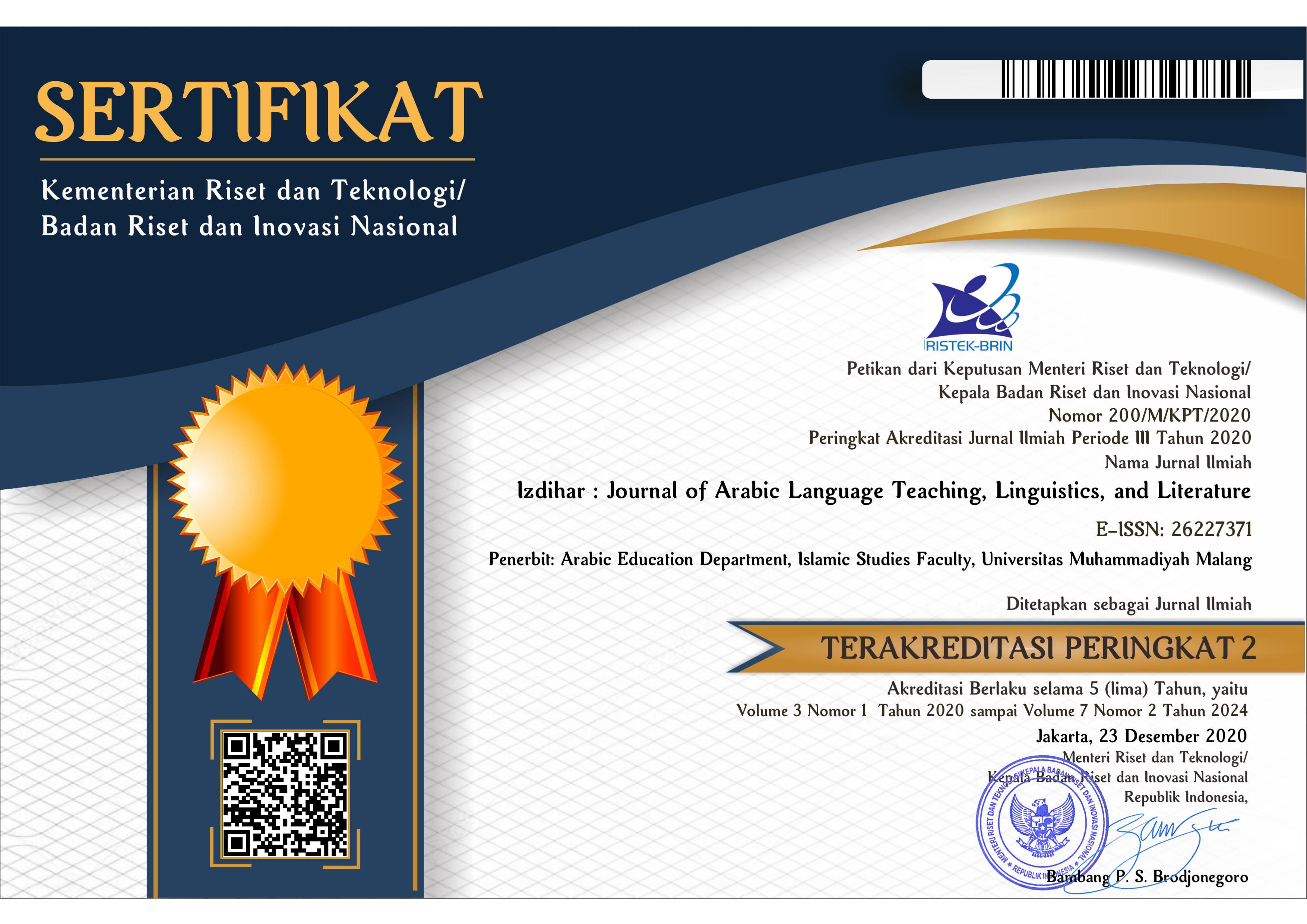Arabic Language Representation in Naming Children: A Case of Shift Naming of Melayu Children
DOI:
https://doi.org/10.22219/jiz.v4i1.16144Keywords:
Identity, Grounded Theory, Melayu Children, Naming Shift, OffspringAbstract
The phenomenon of the shift in the naming of Melayu children, which used to use naming from the Arabic language, has recently shifted in Palembang, South Sumatera, Indonesia. It has an effect on how parents perceive the Arabic language. This study aimed to 1) analyze the trend of naming Melayu children in Palembang, 2) analyze the influence of the Arabic language on parents in naming Melayu children, and 3) analyze the naming transformation of Melayu children. The methodology used by researchers was a qualitative method using a socio-onomastic approach. The population was taken from students of STIKES Siti Khadijah Palembang and students of MTs.N 2 Palembang. Data were analyzed using Strauss and Corbin’s grounded theory model. The results showed: 1) there were three trends in naming Melayu children: a) hereditary (using bebangso); b) Arabic language; and c) modern trends. 2) Arabic language influences parents in naming children in various ways: a) on community construction; b) resistance; and c) the influence of public figures. 3) the transformations of the naming of Melayu children in Palembang were: a) naming transformation of children from the descent, Arabic language, and modern to westernized; b) shift in the referential system; and c) the cause of this transformation is a modernization factor that caused parents to transform in naming their children from Arabic language names transformed into modern names. Currently, naming children using Arabic language names is less represented rather than in the early 2000s. This transformation gives birth to a global society, not a local community, which is marked by the names of modern and westernized children.
Downloads
References
A'rof, N. I., Ahwan, Z., Sos, S., & Kom, M. I. (2018). Studi etnografi komunikasi pergeseran nama bercirikan identitas Jawa Tengger pada era generasi 2000-an Suku Tengger di Kabupaten Pasuruan (Tinjauan kritis teori determinisme perkembangan teknologi). Jurnal Heritage, 6(2), 8-15. https://doi.org/10.35891/heritage.v6i2.1132
Abdul Syukur Ibrahim. (1999). Hakikat sosiolinguistik. Modul 1
Abercrombie, N., Hill, S., & Turner, B. S. (2010). Kamus sosiologi. Yogyakarta: Pustaka Pelajar.
Abidin, A. (2016). Pengaruh Islam dalam perubahan nama diri Suku Bugis: Sebuah tinjauan sejarah. IBDA: Jurnal Kajian Islam Dan Budaya, 14(2), 241-253. https://doi.org/10.24090/ibda.v14i2.676
Alwi, A. (2019). Karakter Masyarakat Islam Melayu Palembang. Psikoislamedia: Jurnal Psikologi, 3(1). 1-15. http://dx.doi.org/10.22373/psikoislamedia.v3i1.2869
Amliana, Z. (2016). Akulturasi budaya dalam pemberian nama anak pada keluarga perkawinan campur antara suku Bali dan non-Bali di Desa Kalibukbuk dan Desa Gerokgak Kabupaten Buleleng (Doctoral dissertation, Diponegoro University).
Anderson, J. M. (2007). The grammar of names. Oxford University Press.
Aribowo, E. K., & Herawati, N. (2016). Pemilihan nama Arab sebagai strategi manajemen identitas di antara keluarga Jawa Muslim. Prosiding Prasasti, 270-277. https://doi.org/10.20961/pras.v0i0.1508
Ascalonicawati, A. P. (2019). Variasi pemilihan nama pada generasi alfa. Proceeding of the URECOL, (10). 292-297. http://repository.urecol.org/index.php/proceeding/article/view/772
Askuri, A., and Kuipers, J. C. (2018). The Politics of Arabic naming and Islamization in Java: Processes of hybridization and purification. Al-Jāmi‘ah: Journal of Islamic Studies. 56(1). 59-94. https://doi.org/10.14421/ajis.2018.561.59-94
Bakti, I. S., Hamdi, E., & Nur, M. (2018). Pergeseran pola pemberian nama anak pada generasi millenial dan post-millenial. Jurnal Sosiologi USK (Media Pemikiran & Aplikasi), 12(1), 24-37. http://202.4.186.66/JSU/article/view/11694
Barker, C. (2004). Cultural studies: Teori dan praktik. Kreasi Wacana.
Blanar, V. (2009). Proper names in the light of theoretical onomastics. Namenkundliche Informationen, 95(96), 89-157.
Corbin, J. M., & Strauss, A. (1990). Grounded theory research: Procedures, canons, and evaluative criteria. Qualitative sociology, 13(1), 3-21. https://doi.org/10.1007/BF00988593
Divika, A. H. Y. (2019). Adat dalam perspektif dakwah (Studi etnografi tradisi pemberian nama anak dalam Suku Melayu). At-Tadabbur: Jurnal Penelitian Sosial Keagamaan, 9(1), 123-138. http://ejournal.an-nadwah.ac.id/index.php/Attadabbur/article/view/88
Emzir, M. (2012). Metodologi Penelitian Kualitatif Analisis data. Raja Grafindo.
Erom, K. (2020). Sistem penamaan masyarakat Manggarai: Studi kasus dalam perspektif linguistik kebudayaan. Jurnal Pendidikan Bahasa dan Sastra, 19(1), 72-85. https://doi.org/10.17509/bs_jpbsp.v19i1
Fakuade, G., Williams, A., Nnaji, I., & Odeigah, T. (2018). A Shift in Batonu personal naming practices. Voprosy Onomastiki, 15(1), 134-154.
Gunawan, F. S., & Karsono, O. M. F. (2013). Pemberian nama Tionghoa keluarga Sub Suku Fúqīng di Banjarmasin 马辰福清人命名分析. Century: Journal of Chinese Language, Literature and Culture, 1(2), 1-11. https://doi.org/10.9744/century.1.2.1-11
Hidayah, N. (2018). Negosiasi identitas kultural melalui bahasa. Jurnal Ilmiah Ar-Risalah: Media Ke-Islaman, Pendidikan dan Hukum Islam, 16(1), 15-37. http://ejournal.iaiibrahimy.ac.id/index.php/arrisalah/article/view/1016
Husein, T., & Athoillah, A. F. (2013). Kamus Akbar Bahasa Arab Indonesia-Arab. Jakarta: Gema Insani.
Hayati, N. (2013). Negosiasi identitas dalam pemberian nama. Humanika, 17(1). 21-38. https://ejournal.undip.ac.id/index.php/humanika/article/view/5309/4770
Kosasih, D. (2010). Kosmologi Sistem Nama Diri (Antroponim) Masyarakat Sunda dalam Konstelasi Perubahan Struktur Sosial Budaya. Makalah Seminar Internasional Hari Bahasa Ibu dengan tema, “Menyelamatkan Bahasa Ibu sebagai Kekayaan Budaya Nasional” di Gedung Merdeka tanggal 19-20 Februari 2010.
Kuipers, J. C., & Askuri. (2017). Islamization and identity in Indonesia: The case of Arabic names in Java. Indonesia, (103), 25-49. https://doi.org/10.5728/indonesia.103.0025
Narbuko, C., & Achmadi, A. (2013). Metodologi penelitian kuantitatif. PT. Bumi Aksara
Pujileksono, S. (2015). Pengantar antropologi memahami realitas sosial. Intrans Publishing
Putra, Y. S. (2016). Theoretical review: Teori perbedaan generasi. Jurnal Among Makarti, 9(2). 123-134. http://dx.doi.org/10.52353/ama.v9i2.142
Resticka, G. A. (2019). Bentuk satuan kebahasaan dalam nama diri orang masyarakat Banyumas. Prosiding Seminar Nasional dan Call for Papers ”Pengembangan Sumber Daya Perdesaan dan Kearifan Lokal Berkelanjutan VIII” 14-15 November 2018 Purwokerto, 8(1). 179-190. http://www.jurnal.lppm.unsoed.ac.id/ojs/index.php/Prosiding/article/view/639
Rini, N., Zees, S. R., & Pandiya, P. (2018). Pemberian nama anak dalam sudut pandang bahasa. Epigram, 15(2). 145-154 https://doi.org/10.32722/epi.v15i2.1276
Temaja, I. G. B. W. B. (2017). Sistem penamaan orang Bali. Humanika, 24(2). 60-72. https://doi.org/10.14710/humanika.v24i2.17284
Widodo, S. T. (2013). Konstruksi nama orang Jawa studi kasus nama-nama modern di Surakarta. Humaniora, 25(1), 82-91. https://doi.org/10.22146/jh.1815
Downloads
Published
How to Cite
Issue
Section
License
Copyright (c) 2021 Novi Ulfa Safitri, Moh. Fery Fauzi, Izdihar : Journal of Arabic Language Teaching, Linguistics, and Literature

This work is licensed under a Creative Commons Attribution-ShareAlike 4.0 International License.
Copyright Notice
Authors who publish with this journal agree to the following terms:
- Authors retain copyright and grant the journal right of first publication with the work simultaneously licensed under a Creative Commons Attribution-ShareAlike 4.0 International License that allows others to share the work with an acknowledgment of the work's authorship and initial publication in this journal.
- Authors are able to enter into separate, additional contractual arrangements for the non-exclusive distribution of the journal's published version of the work (e.g., post it to an institutional repository or publish it in a book), with an acknowledgment of its initial publication in this journal.
- Authors are permitted and encouraged to post their work online (e.g., in institutional repositories or on their website) prior to and during the submission process, as it can lead to productive exchanges, as well as earlier and greater citation of published work (See The Effect of Open Access).
Copyright (c) 2019 Izdihar : Journal of Arabic Language Teaching, Linguistics, and Literature

This work is licensed under a Creative Commons Attribution-ShareAlike 4.0 International License.


















